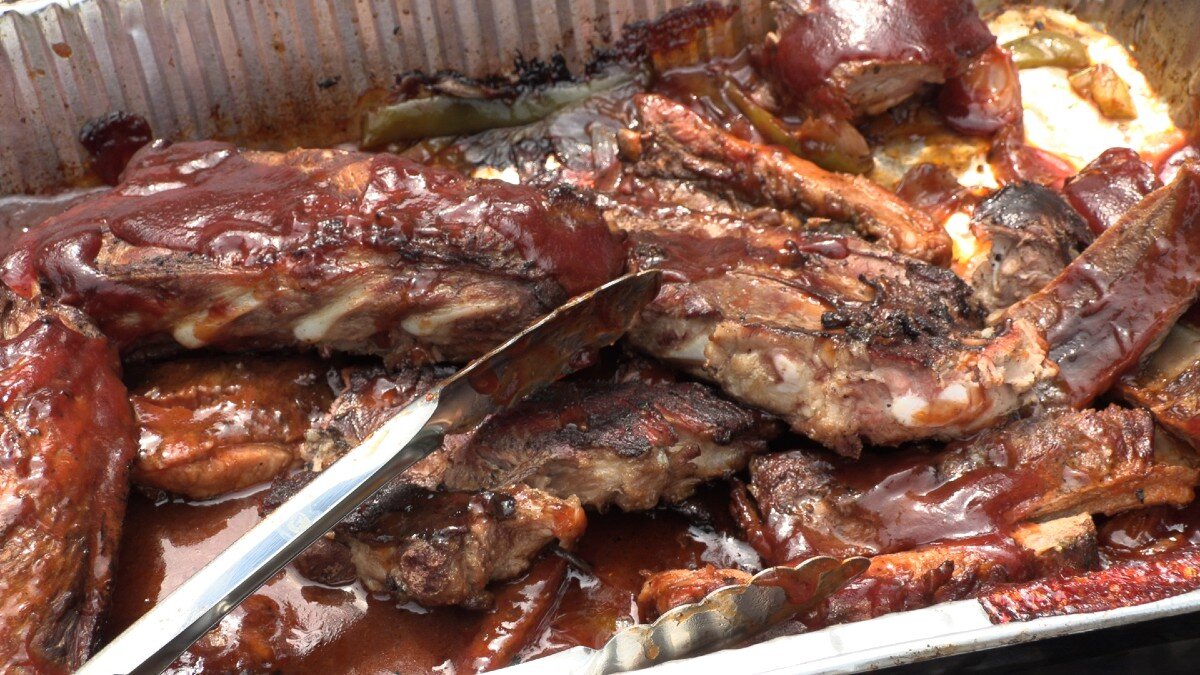'Thanksgiving in July' event uplifts and serves people experiencing homelessness

DENVER — "The homeless population is skyrocketing. There are new faces I see every day. It's crazy, it's unbelievable," Sioux Martin said. "It doesn't feel right. Do you know what I'm saying? Why is it like this?”
Martin, 40, is experiencing homelessness. With at least 100 others on Saturday, Martin attended the 5th Annual Thanksgiving in July at Sonny Lawson Park in Five Points—one of many events part of Urban Leadership Foundation of Colorado's (ULFC) Black Excellence Service & Celebration Weekend.
Thanksgiving in July, created by ULFC’s creative consultant and professional strategist Jasmine Elizabeth, is a day dedicated to uplifting and serving those experiencing homelessness throughout Denver. Over 100 volunteers distributed clothing, shoes, tents, water, fully stocked backpacks, and catered food provided by Black-owned Denver businesses.
"Often, we put stereotypes on people who don't have homes. We don't look at them as people. That's why I don't refer to them as homeless. I call them 'people without homes,’" Jasmine Elizabeth explained. "I want you to remember these are people. They want love, they want support, and no matter what led them into this situation, they're worthy!"
Originally from Denver, Elizabeth left the city after high school. When she moved back to Denver in 2016, she immediately noticed a significant increase in the unhoused population, sparking her desire to start Thanksgiving in July.
“Thanksgiving in July is my pride and joy; it's my baby!” Elizabeth said.
In addition to delicious food from Nel’s Downhome BBQ, CJ Sticky Fingers, and more, Saturday’s event felt like a party with participants dancing to live R&B music.

"I see a lot of smiling faces, and that's a great thing to see," said Quiamarjai, a 19-year-old man from Indiana who has been unhoused for a long time.
"I'm delighted with this event. They are giving out food, people are eating. That's one of the best things out here: people are eating, I love to see it," Quiamarjai said. "There are times where people have such large stomach aches and are ready to steal something. There shouldn't be no need for that when we can come together like this and utilize the resources we have out here to help the people out on the street."
Elizabeth said she loves what she does. While she enjoys talking with people about their life journey, she hopes events like this will destigmatize how we talk about and support people like Martin and Quiamarjai.
"When you hear them speak about their life, it moves you. They have stories of perseverance and overcoming obstacles that I can't even imagine," Elizabeth said. "I wish more people had my experiences with people without homes. It makes me sad that we can't support them in other ways, and I wish we could do more."
Martin shared that she has been living on the street off-and-on since she was 12 years old. "I've been through it, hell and back, and I'm glad I'm still here," Martin said, "There is a reason I'm still alive."
She added: "My street name is ‘Soldier Survivor,’ so I'm a soldier and a survivor.”
Event-goers like Martin were ecstatic to receive a tent for free on Saturday, “because tents make homes,” she said.
Another man named Daniel Fulton shared that he is originally from New Mexico and has been living in Denver for about 11 years, but has spent the last seven years without a home.
"There are so many things we have to go out and sacrifice ourselves for or humiliate ourselves for to get the things we need," Fulton said. "Being on the street makes you do things that you thought you would never have to do."
Elizabeth said one of the biggest things she wants housed people to understand is that people without homes are regular people.
"Don't downgrade us. We're just like everybody else. You never know if you will become homeless. It could happen to anyone," Martin said. "I once owned a home myself. My last house was on 22nd and Downing. I lived there for five years with my son."
While Elizabeth’s event can't fix Denver’s homelessness crisis, she plans to continue hosting Thanksgiving in July and helping as much as she can as long as it helps relieve someone's stress for one day out of the year.
"Events like Saturday instills hope in me," Fulton said. "It gives us homeless folks hope that there are people that don't hate us because after a while living out on the streets, it changes you, and you often feel like the whole world hates you."
Lindsey Ford is a multimedia journalist at Rocky Mountain PBS. You can reach her at lindseyford@rmpbs.org.
Julio Sandoval is a multimedia journalist at Rocky Mountain PBS. You can reach him at juliosandoval@rmpbs.org.
